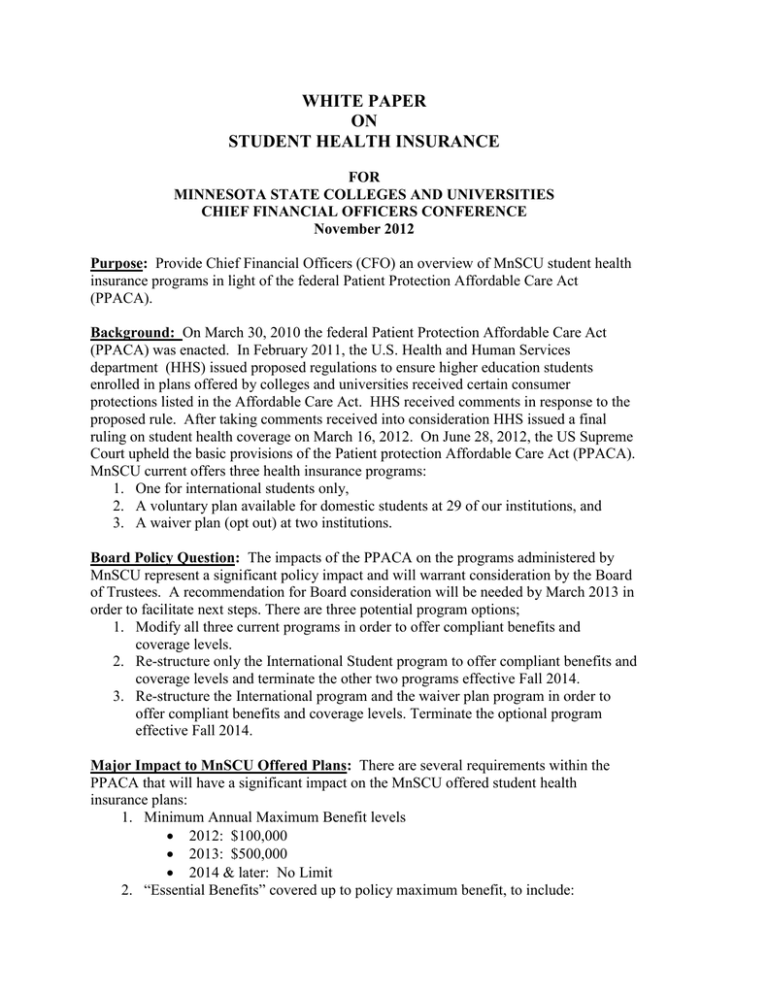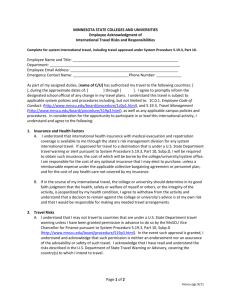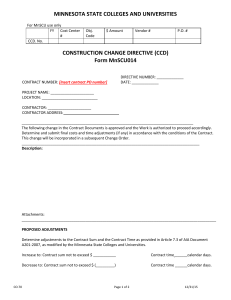WHITE PAPER ON STUDENT HEALTH INSURANCE
advertisement

WHITE PAPER ON STUDENT HEALTH INSURANCE FOR MINNESOTA STATE COLLEGES AND UNIVERSITIES CHIEF FINANCIAL OFFICERS CONFERENCE November 2012 Purpose: Provide Chief Financial Officers (CFO) an overview of MnSCU student health insurance programs in light of the federal Patient Protection Affordable Care Act (PPACA). Background: On March 30, 2010 the federal Patient Protection Affordable Care Act (PPACA) was enacted. In February 2011, the U.S. Health and Human Services department (HHS) issued proposed regulations to ensure higher education students enrolled in plans offered by colleges and universities received certain consumer protections listed in the Affordable Care Act. HHS received comments in response to the proposed rule. After taking comments received into consideration HHS issued a final ruling on student health coverage on March 16, 2012. On June 28, 2012, the US Supreme Court upheld the basic provisions of the Patient protection Affordable Care Act (PPACA). MnSCU current offers three health insurance programs: 1. One for international students only, 2. A voluntary plan available for domestic students at 29 of our institutions, and 3. A waiver plan (opt out) at two institutions. Board Policy Question: The impacts of the PPACA on the programs administered by MnSCU represent a significant policy impact and will warrant consideration by the Board of Trustees. A recommendation for Board consideration will be needed by March 2013 in order to facilitate next steps. There are three potential program options; 1. Modify all three current programs in order to offer compliant benefits and coverage levels. 2. Re-structure only the International Student program to offer compliant benefits and coverage levels and terminate the other two programs effective Fall 2014. 3. Re-structure the International program and the waiver plan program in order to offer compliant benefits and coverage levels. Terminate the optional program effective Fall 2014. Major Impact to MnSCU Offered Plans: There are several requirements within the PPACA that will have a significant impact on the MnSCU offered student health insurance plans: 1. Minimum Annual Maximum Benefit levels 2012: $100,000 2013: $500,000 2014 & later: No Limit 2. “Essential Benefits” covered up to policy maximum benefit, to include: Preventative Care at 100% in-network with no cost sharing Contraceptive services with no cost sharing Prescriptions 3. Medical Loss Ratio (MLR) This is the amount a firm spends on paying claims and improving the quality of care. Ex: If company A spends $0.80 of every premium dollar earned on claims and activities that improve the quality of care and the remaining $0.20 is spent on overhead costs, salaries, marketing, administrative costs, agent commissions and profits; Then company A will have a MLR of 80%. 4. The Act requires the MLR to reach : 2013: 69.6% 2014: 80% 5. Children are able to stay on parents policy until age 26 What are “Essential Benefits”?: Essential Benefits are categories of comprehensive items and services: Ambulatory patient services Emergency services Hospitalization Maternity and newborn care Mental health & substance use disorder services, including behavioral health treatment Prescription drugs Rehabilitative & habituate services & devices Laboratory services Preventive & wellness services and chronic disease management Pediatric services, including oral & vision care Current MnSCU Plan Comparisons: MnSCU offered three types of plans, one for international students only, a voluntary plan available for domestic students at 29 of our institutions, and a waiver plan at two institutions. Health Insurance Plan Enrollment History: Participation in MnSCU student health insurance plans by domestic student has been relatively small and has dropped by more than 40% over the last 4 years. Financial Impact of PPACA to MnSCU Students: All plans offered by health insurance providers are to be compliant and meet specific mandates outlined in PPACA. MnSCU offered plans experienced a significant premium increase in order to become compliant with the first phases of PPACA and will experience additional increases until fully compliant in 2014. Healthy Student: According to a March 28, 2008, US Government Accountability Office report, most college students are covered through employer-sponsored plans, and some colleges and state are taking steps to increase coverage through required insurance programs. These colleges see healthy students as being more likely to be academically successful while representing a cohort with a potentially advantageous premium structure. “Students who enroll in plans offered by colleges with health insurance requirements generally are healthier than those who voluntarily enroll in plans offered by colleges without a requirement. Because larger and healthier populations typically enroll in student insurance plans offered by colleges with an insurance requirement, these colleges are generally able to offer plans with more comprehensive benefits or more affordable premiums than they would otherwise have been able to offer if they did not have such a requirement.” Next Steps and Timeframe: In preparation for a recommendation to the Board, there will be continued discussions with college and university leadership and staffs, as wells and students and student advisory groups. Effective January 1, 2014, PPACA will be fully implemented. Our current carrier has indicated they will provide a voluntary plan for the 2013-2014 academic year. This will allow time create a student health insurance recommendation and strategy for implementation in the fall of 2014. By that time there will be more direction on the state exchange market and its impact to our students. Target Dates: Summer 2013: Decision on whether MnSCU will continue to offer a student health insurance plan. If so, which of the three types described above will be in the best interest of MnSCU students and system? Fall 2013: If decision is to offer a plan. Send out RFP to potential health insurance carriers to bid for 2014-2015 school year. Fall 2013 (Nov/Dec): Review proposals and award bid to carrier. Winter (Jan/Feb) 2014: Market new plan to campuses. Submitted by Keswic Joiner, System Director – Risk Management

